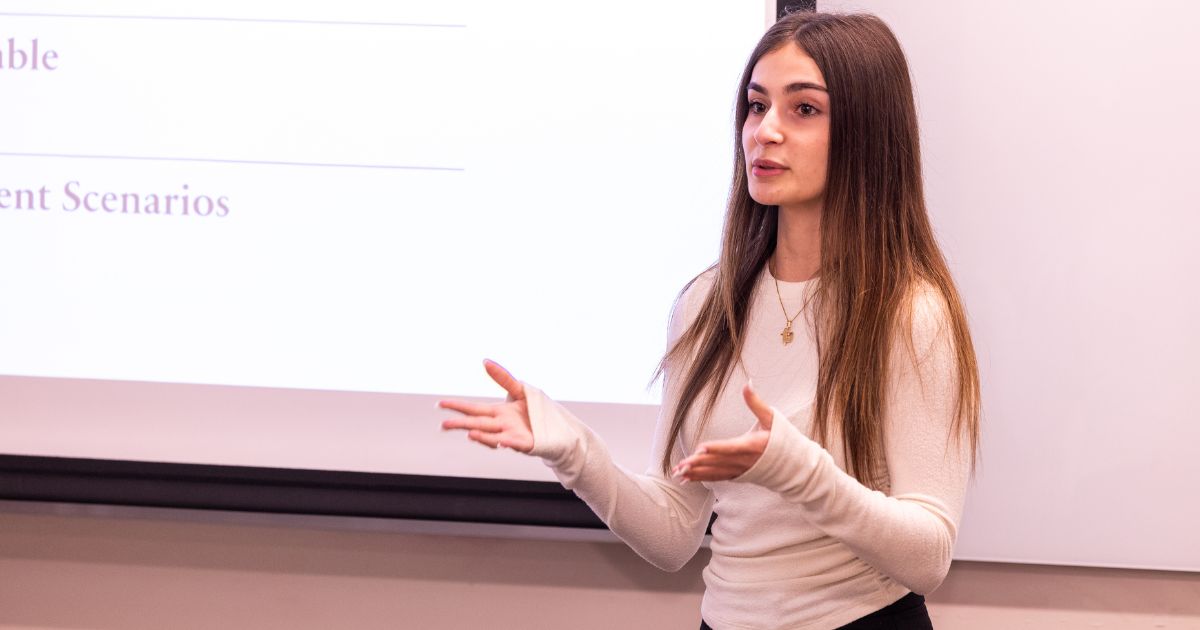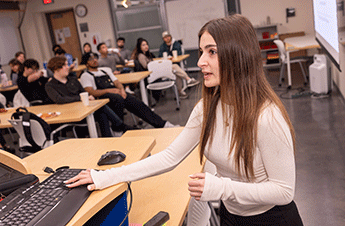Making a Good First Impression Takes More Than a Firm Handshake

During her summer internship at JP Morgan Chase, Nairi Enright ’24 met many people from a variety of departments.
She came to realize just how important those meeting were. She was making first impressions and taking the initial steps in forming relationships. Her success in the internship, she ascertained, relied as much on how she was presenting herself as the technical skills she knew. “A first impression can say a lot about you,” Enright says, “and can open so many opportunities for you if it’s a good one.”
This semester, Enright taught a senior-led seminar at Babson on how to navigate those first meetings in life, whether at the office, the classroom, or the party. The popular senior-led seminars allow seniors to teach a noncredit, five-week course on their interests to their fellow students. Through the years, the seminars have touched on a range of topics, from how to put together a portfolio to how to build a surfboard.
With her seminar, entitled First Impressions: How to Present Your Best Self, Enright hoped to bolster attendees before those sometimes awkward yet often consequential first encounters. “Meeting new people is nerve wracking,” she says. “I want to give people the confidence to go into first impressions.”
For Babson Thought and Action, Enright shared some key strategies for making a good first impression.
For starters, making a good first impression involves certain basics: eye contact, a solid handshake, a commitment to truly listening to others. Before even meeting someone new, however, the ability to present your best self starts with reflection and introspection. Think about your personal brand, about what skills and attitudes define you, and how you want to carry yourself with others.
Here are six tips to consider:
1. Know Your Brand
Making a good first impression begins with knowing your personal brand. Consider your strengths, skills, and values. As you meet new people, your behavior should be guided by the core of who you are. “It is about knowing yourself,” Enright says. “It is your home base. If you know yourself really well, you’ll know how to navigate meetings with others.”
2. Stay Consistent
Knowing your brand will help you stay consistent, preventing you from presenting yourself one way to one person and then acting differently five minutes later with another. People who know you—family, friends, co-workers—should all describe you the same way. “There is a consistency to your character,” Enright says. “That builds credibility and trust.”

That consistency matters, even if you think the person you’re trying to impress isn’t watching. “How you act when no one is watching is a reflection on you, too,” Enright says.
In short, be yourself. The ultimate goal is authenticity. “You don’t have to put energy in a fake persona. That is real draining,” Enright says. “How you perceive yourself should match up generally with how others perceive you.”
3. Be Intentional
Before meeting new people, know how much time you will have with them. “If you have a limited amount of time, be intentional about what you want to talk about,” Enright says.
Consider what kind of feeling or impact you want to leave people with in that amount of time. Be intentional about that as well. Enright points to a famous quote often attributed to Maya Angelou. “People will forget the things you do, and people will forget the things you say,” the quotation goes, “but people will never forget how you made them feel.”
4. When Late, Say Something
Making a good first impression is a lot harder if you’re late. “Being late can have a lot of negative connotations,” Enright says.
If it happens, acknowledge your tardiness. Express gratitude to those left waiting, telling them you value their time. Thank them for their patience.
5. Be Engaged
Greeting someone new with a handshake that is firm and self-assured is important, of course, but that’s only a start. “These are just the foundational things,” Enright says.
Eye contact is also important. Don’t look at the ground. Don’t look at your phone either. And, really listen to what people are saying. Don’t talk too much or cut people off. Ask open-ended questions and engage with their answers. If you find yourself saying the same reply over and over (“that’s amazing” or “how wonderful”), you need to dig deeper.
“Make sure what you say is thoughtful,” Enright says. “You can feel when a conversation has energy and when it doesn’t.”
“A first impression can say a lot about you, and can open so many opportunities for you if it’s a good one.”
Nairi Enright ’24
6. Put Yourself Out There
Getting out of your comfort zone and meeting new people isn’t easy. “We gravitate toward people who give us a sense of familiarity,” Enright says.
Despite that uneasiness, Enright says to try to meet new people anyway. Go to the party, even if you won’t know many people there. Attend the networking event, even if it will feel awkward. The more time you spend in these situations, the more confident you become.
“We adapt over time,” she says. “Put yourself out there.”
Posted in Insights






